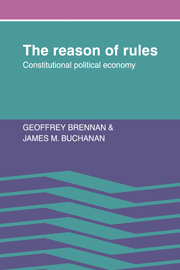Book contents
- Frontmatter
- Contents
- Preface
- 1 The constitutional imperative
- 2 The contractarian vision
- 3 The myth of benevolence
- 4 Modeling the individual for constitutional analysis
- 5 Time temptation, and the constrained future
- 6 Politics without rules, I: Time and nonconstrained collective action
- 7 Rules and justice
- 8 Politics without rules, II: Distributive justice and distributive politics
- 9 Is constitutional revolution possible in democracy?
- Index
2 - The contractarian vision
Published online by Cambridge University Press: 05 November 2011
- Frontmatter
- Contents
- Preface
- 1 The constitutional imperative
- 2 The contractarian vision
- 3 The myth of benevolence
- 4 Modeling the individual for constitutional analysis
- 5 Time temptation, and the constrained future
- 6 Politics without rules, I: Time and nonconstrained collective action
- 7 Rules and justice
- 8 Politics without rules, II: Distributive justice and distributive politics
- 9 Is constitutional revolution possible in democracy?
- Index
Summary
Introduction
Our purpose in this chapter is to describe the normative position from which we approach the whole set of issues involving the rules of social order. Through what window do we view the world of social interaction, actual or potential? Until we make ourselves clear in this respect, we may seem to be “speaking in tongues” to those whose perspective differs categorically from our own. Our position is explicitly and avowedly contractarian. This term alone will identify the conceptual framework to those familiar with classical political philosophy, especially with those works that embody the intellectual foundations of liberal society. To counter the most familiar and pervasive criticisms of this position, we must note that the contractarian construction itself is used retrospectively in a metaphorically legitimizing rather than historical sense. Prospectively, the model issused in both a metaphorically evaluative and an empirically corroborative sense.
The relationship between the contractarian philosophical perspective and the rules-oriented, or constitutionalist, perspective is not so direct as it may at first appear. Section II examines this relationship and briefly discusses possible noncontractarian elements in constitutional thought. The contractarian perspective is grounded in individualistic presuppositions about the ultimate sources of value and of valuation. These precepts are examined in Section III, particularly in contrast to other, more familiar nonindividualistic teleologies. Section IV presents the contractarian paradigm in its most well-known setting, that of ordinary economic exchange.
- Type
- Chapter
- Information
- The Reason of RulesConstitutional Political Economy, pp. 19 - 32Publisher: Cambridge University PressPrint publication year: 1986



